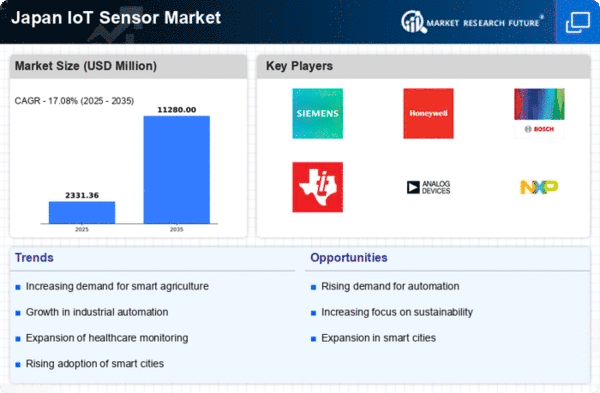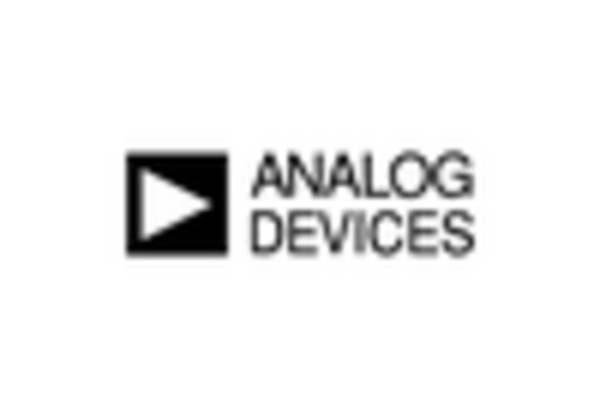Rising Demand for Automation
The increasing demand for automation across various sectors in Japan is driving the growth of the The increasing demand for automation across various sectors in Japan is driving the growth of IoT sensors.. Industries such as manufacturing, agriculture, and logistics are increasingly adopting automated solutions to enhance efficiency and reduce operational costs. For instance, the manufacturing sector has seen a surge in the implementation of smart factories, where sensors play a crucial role in monitoring equipment and optimizing production processes. This trend is expected to contribute to a projected market growth of approximately 15% annually in the iot sensor market. As companies seek to streamline operations and improve productivity, the reliance on advanced sensor technologies is likely to intensify.
Advancements in Sensor Technology
Technological advancements in sensor capabilities are propelling the iot sensor market forward. Innovations such as miniaturization, enhanced connectivity, and improved data analytics are making sensors more efficient and versatile. The introduction of next-generation sensors that can operate in extreme conditions or provide real-time data analytics is particularly noteworthy. These advancements are likely to attract investments, with the market expected to reach ¥500 billion by 2027. As industries recognize the potential of these advanced sensors, the demand for innovative solutions in the iot sensor market is anticipated to rise significantly.
Government Initiatives and Support
The Japanese government is actively promoting the adoption of IoT technologies, which significantly impacts the iot sensor market. Initiatives such as the 'Society 5.0' vision aim to integrate advanced technologies into everyday life, enhancing economic growth and societal well-being. Financial incentives and subsidies for businesses investing in IoT solutions are also being offered, which could potentially increase market penetration. Reports indicate that government funding for IoT projects has reached over ¥100 billion, fostering innovation and development in the iot sensor market. This supportive environment is likely to encourage more companies to invest in sensor technologies, further driving market expansion.
Increased Investment in Smart Infrastructure
Investment in smart infrastructure is a key driver for the iot sensor market in Japan. As urban areas continue to expand, there is a growing need for intelligent systems that can manage resources effectively. Smart grids, intelligent transportation systems, and connected public services are becoming more prevalent, all of which rely heavily on sensor technologies. The Japanese government has allocated over ¥200 billion for smart city projects, which is expected to enhance the deployment of sensors in urban environments. This trend suggests a robust future for the iot sensor market, as infrastructure development aligns with technological advancements.
Growing Focus on Environmental Sustainability
There is a notable shift towards environmental sustainability in Japan, which is influencing the iot sensor market. Companies are increasingly utilizing sensors to monitor and manage energy consumption, waste management, and resource allocation. For example, smart sensors are being deployed in urban areas to optimize energy use in buildings, contributing to a reduction in carbon emissions. The market for environmental monitoring sensors is projected to grow by approximately 20% in the coming years, as businesses and municipalities seek to meet sustainability goals. This trend indicates a strong alignment between environmental initiatives and the growth of the iot sensor market.














